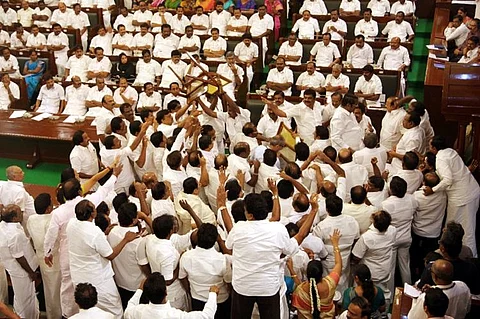

To characterise Saturday’s ruckus in the Tamil Nadu Assembly as betokening the post-Jayalalithaa-Karunanidhi politics is almost ahistorical.
Yes, Jayalalithaa is no more, and the DMK patriarch has been out of public view and reportedly unwell for some time. Still, the fact remains that whatever is happening is very much a Dravidian legacy – the absence of towering personalities notwithstanding.
Jaya’s confidante is not a novice in politics as some tend to imagine, she was part of all the wheeling and dealing of her late boss. A Left leader has been quoted as saying Sasikala used to take an active part in seat-sharing negotiations and that he used to be surprised by her intimate knowledge of the voting trends in various constituencies.
If she is therefore carrying on from where Jayalalithaa left off, Stalin too was taking a leaf out of his father’s book when he was presiding over the bedlam.
Anything goes – that is the bottom line. But it is not as if Dravidian politicians are all goons, while the Congress ones are saints. We have seen the disastrous slide there since Jawaharlal Nehru.
However, the Congress approach used to be qualitatively different; its way of shepherding voters to the polling booth was known as ‘overhead mobilization.’ That is, the respective village heads were entrusted with the task of shepherding in return for favours, and one defied the fiat at one’s own risk, of course. That is too simplified a formulation, but that was what was essentially happening all over the country till perhaps 1967.
In such a rule of the elite for the elite in the name of the people, there was little need to nurture the grassroots. In the circumstances, the DMK’s victory was the revolt of the subalterns, and it would do anything to strengthen its appeal among its constituency.
Still so long as its founder, CN Annadurai, was at the helm, the gentlemanly streak continued – both in governance and in the Assembly proceedings. The party itself, though, was far more aggressive than the Congress on various fronts.
But Karunanidhi’s ascent in 1969 (after Annadurai’s death) changed everything. Gone out of the window were sobriety and amiable sparring. The gloves were off: the Opposition could be slandered to no end; the trade union movement crushed; even theatres screening films lampooning the ruling party – like Cho’s Mohammed Bin Thuglaq – could be vandalised; and distributors coming forward to screen MGR’s films after he fell out with Karunanidhi could be intimidated.
When people talk of violence in the Assembly, they immediately recall the horrid incidents after MGR died and the AIADMK split – when the police lathicharged legislators during the Vote of Confidence moved by the then government of MGR’s widow Janaki.
But an earlier event – though far less blood-curdling, yet a quite outrageous and clear subversion of all norms – tends to be forgotten.
In 1972 MGR was thrown out, and there were huge popular protests – but the party machinery was firmly in the hands of Chief Minister Karunanidhi and his associates. Among the dissenters was Speaker KA Mathiazhagan, and that sent some jitters.
After all, in West Bengal, Speaker Bejoy Kumar Bannerjee had abruptly adjourned the House sine die in 1967, declaring the newly installed Congress-proxy government illegal. He was reportedly acting on the advice of CPI’s Mohan Kumaramangalam, a redoubtable Tamil lawyer.
What if Mathiazhagan chose to do something similar? So, even before he was voted out, his mic was switched off. And the Deputy Speaker, a Karunanidhi loyalist, began to conduct the proceedings, sitting by the side of a mic-less Speaker.
An outwitted Mathiazhagan gamely strove to do his bit, asking MGR to move a no-confidence motion. MGR, in turn, went on to speak for hours together, again without a mic, even while the Deputy Speaker was going ahead with the agenda set by Karunanidhi.
The charade didn’t last long, and the wily Chief Minister managed to establish who the boss was. Outside the Assembly, he called MGR names and sought to whip up anti-Malayali sentiments – some Malayali establishments were attacked and vain attempts made to block screenings of his films. Of course, nothing worked in the face of MGR’s charisma, but Karunanidhi went all out to remain in power.
So, if today, the AIADMK speaker, possibly a Sasikala loyalist, is set upon by the DMK MLAs fearing Edappadi Palaniswamy would win the vote of confidence it is history repeating itself in another form.
So also, if Sasikala manages to hold the flock together, with both carrot and stick, she is faithfully following in the footsteps of Jayalalithaa. She brings round an unhappy Sengottaiyan, keeping him content with inconsequential party posts and equally inconsequential ministries. But even more importantly, she ensures one of the Mannargudi men will be in place to run the party in her absence, and anyway remote-controls everything from behind bars.
The more things change, the more they remain the same.
Note: Views expressed are personal opinions of the author.